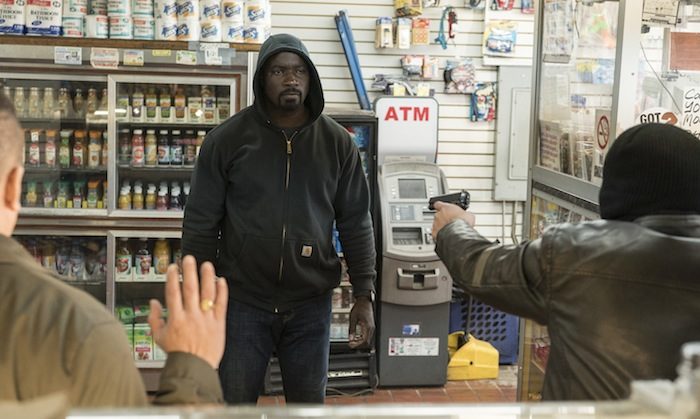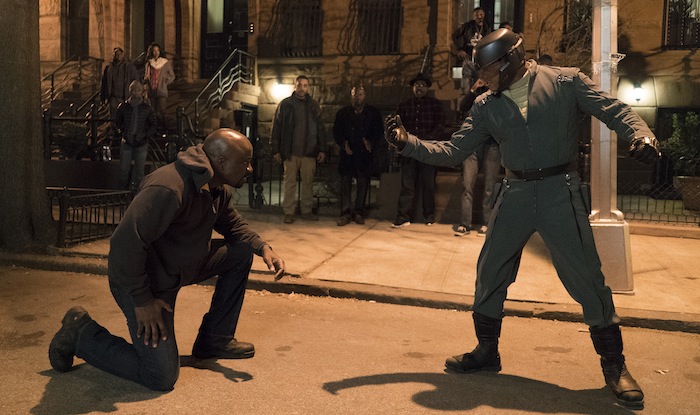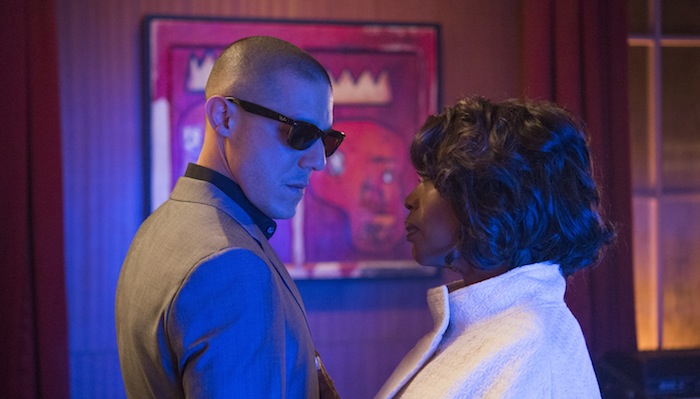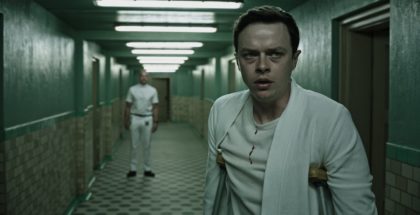Netflix UK binge review: Luke Cage, Episode 12 and 13 (spoilers)
Review Overview
Powerful message
8Disappointing punch-up
4Method Man
6David Farnor | On 18, Oct 2016
Warning: This contains spoilers. Not seen Luke Cage? Read our spoiler-free review of the first three episodes. Read our other reviews of Luke Cage Season 1 here.
Method Man is now part of the Marvel Cinematic Universe. That’s the main takeaway point from Luke Cage’s Season 1 finale, which winds up events in a consistently uneven fashion.
Netflix’s series stunned in its opening chapters, as it presented us with an undeniably powerful image in 2016: a Black man who couldn’t get shot by the police. For those tuning in expecting a straight-forward superhero story, it was an aptly powerful punch. But that fantastic first half stepped down several rungs on the quality ladder when the show kicked off its second part, introducing Diamondback, Cage’s cartoonish brother, to the mix. By the time we reach these last two episodes, Luke Cage has thrown any pretence of subtlety out of the window.
We meet Method Man in a corner shop, when Luke ducks in to save the store from an armed robbery. The sight of them both geeking out over meeting the other celebrity is a joy, but then Method Man goes onto the radio and performs a rap (Bulletproof Love) all about how Luke Cage is an inspirational figure. It’s a strong bit of music, but it also spells out the show’s message and themes a little too explicitly; subtext has become surtext and it’s hard for that not to be disappointing.
His rap is accompanied by a stirring montage of people in the street wearing bullet-riddled hoods to help Cage blend in to the crowd, as he goes on the run – we told you there was little point in him being arrested in Episode 11. “More people are rooting for you than you think,” one cop tells him, after chasing him down in the street and deciding to let him go. The public U-turn’s a little quick to believe, after Mariah whipped up such anti-Cage sentiment among the populace, but the show laid the ground for the connection between Cage and the wider community so well in its first half (“Harlem’s Captain America,” Cottonmouth dubbed him) that it works.
Speaking of the cops on his side, we see Candace tell Misty the truth about Cottonmouth’s death, with Misty recording her confession. Things finally seem to be falling into the right place.
But this is a Marvel tale and, sadly, Marvel rules apply: after all, why would the series end with anything other than a massive fight? And so we end up with Luke, Mariah and Shades meeting at Pop’s old barber shop, them purportedly giving him the evidence to clear his name, only for Diamondback to appear (props to Mariah and Shades for coming up with that play) – complete with his magical electric briefcase, which contains his power suit. You know, the one that allows him to punch people really hard. Because there’s nothing more thrilling than watching people punch each other really hard.
Sure enough, that’s exactly what we get for the majority of Episode 13 – and it’s an underwhelming experience. Mike Colter remains fantastic to watch as Cage, a deliberately understated counterpart to Erik LaRay Harvey’s Diamondback, but there’s never any doubt over who will win this fight – no matter how many batteries our bad guy has strapped to his arms.
The show attempts to up the stakes to more than just a personal vendetta (the crowds of Harlemites watching on, and the kids videotaping the clash for the web, are wonderfully realistic touches) but then the show introduces flashbacks of Cage and Stryker boxing when younger, which feel far too forced.
After Luke knocks Diamondback out – rather than, say, smashing the power-pack on his back with his hands – Diamondback is arrested and Luke’s name is cleared, until Mariah “loses” the files that prove his innocence. At the same time, Shades uses Misty’s phone to get hold of Candace and kill her.
It’s a cunning one-two, which confirms Mariah and Shades as the two future villains for the Luke-Cage-verse – an excellent choice, as (Cottonmouth aside), they have been the two best nasty characters in the show. Littlefinger but with sunglasses, Theo Rossi’s quiet presence has managed to be intimidating and cool in equal measure – not bad for someone who has to act with his body, rather than his eyes. Alfre Woodard, meanwhile, has been consistently superb as Mariah, pushing aside any initial internal conflicts to emerge as equally manipulative and ambitious.
The show’s fine work with its female cast hasn’t ended, either, as Simone Missick’s frustrated Misty discovers that Candace has been killed – and that her supervisor blames her for not letting the police force protect their star witness. The writing throughout the show has done a fantastic balancing act of critiquing society and the system, without solely pinning the blame on the latter. Luke, for example, willingly goes back into prison, as he’s aware he owes the state of Georgia time, after he broke out all those years ago.
“I know a good lawyer,” quips Claire, a neat nod to Daredevil and a reminder of just how good the chemistry between Rosario Dawson and Colter has been (we’re still waiting for them to get that coffee, even now they’ve agreed that they will).
The result is a symbolic finale that’s also satisfying, partly because it teases the way for Matt Murdock and Cage to meet and kick-start The Defenders crossover series, but mostly because it puts an end to the show before its habit for stating the obvious gets too out of control. Yet even amid the on-the-nose speeches, Luke Cage still manages to lay some thought-provoking seeds in its final hours – at one point, Method Man notes that Cage’s skin colour is more of a priority in the cops’ minds than the fact that he has superpowers (even when trying to do good with his powers, the fact that Luke is different only reinforces that bias against him). And, at the end of the day, even the most telegraphed message from the show doesn’t change the significance of the message itself: uneven second half or no, Luke Cage is a groundbreaking, important, urgent milestone in modern culture. The first Black superhero since Blade, tackling ideas of gun crime, police violence and the Black Lives Matter movement? Luke Cage is allowed to be obvious at times. And not just because it made Method Man an official part of the MCU (right next to Iron Man and Ant-Man).
The ending gives us a hint of Dr Noah Burstein visiting Diamondback in hospital, which isn’t a hugely promising sign of what’s in store for the programme’s future, but it’s our hero’s rousing determination to put the past behind him that sticks with you. Always forward, Luke Cage says. Here’s hoping the rest of the TV and film industry can follow suit.
All episodes of Luke Cage are available on Netflix UK, as part of an £9.99 monthly subscription.
Photos: Myles Aronowitz / Netflix























